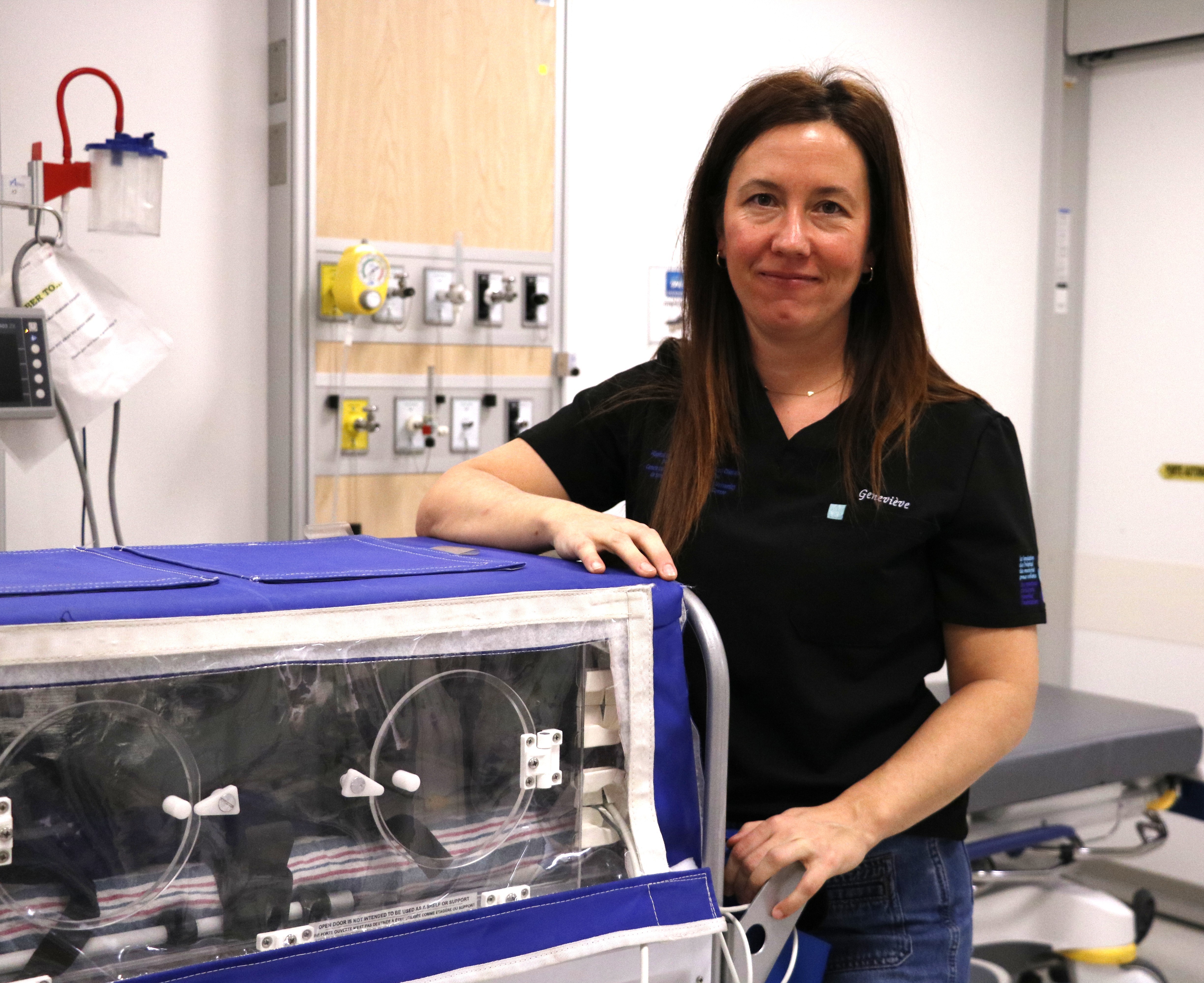
Celebrating Critical Care Transport Nurses at the MCH
18 February 2026
Rise in respiratory infections and measles outbreak: important infection prevention measures at the Montreal Children’s Hospital.
Read moreWelcome to the Montreal Children's Hospital

4 May 2016
The findings add to the increasingly overwhelming evidence in favour of newborn screening as a way to improve the quality of life for patients
A new study led by a team from the Research Institute of the McGill University Health Centre (RI-MUHC) and Cystic Fibrosis Canada reinforces the benefits of newborn screening for cystic fibrosis (CF) patients. Despite the fact that newborn screening has been implemented across North America and in several European countries as a way to improve overall survival rate and health outcomes of people living with CF, it is still not available in Quebec. The findings, recently published online in the Journal of Cystic Fibrosis, add to the increasingly overwhelming evidence in favour of newborn screening as a way to improve the quality of life for patients living with this chronic disease that is still incurable.
“Our study shows that newborn screening is effective and should be seen as an opportunity to do early preventive intervention,’’ says the study’s senior author, Dr. Larry Lands, director of Pediatric Respiratory Medicine and CF clinic at the Montreal Children’s Hospital of the MUHC (MCH-MUHC) and a professor in the Department of Pediatrics at McGill University. “Children with CF who are diagnosed through newborn screening are healthier and will benefit more from new treatments.’’
CF is caused by mutations in the CFTR gene that mainly affects the respiratory and digestive systems. It is characterized by thick and sticky mucus that plugs up tubes, ducts and passageways, especially in the lungs and pancreas leading to pulmonary chronic infection and loss in lung function over time. It is estimated that one in every 3,600 children born in Canada has cystic fibrosis.
“Given the changes in clinical management for CF, we questioned whether or not newborn screening for CF was still beneficial,” says the study’s lead author Dr. Denise Mak, Program Manager, Healthcare at Cystic Fibrosis Canada. “We wanted to know in an unbiased way whether newborn screening was beneficial to Canadian CF patients, or whether current treatments would allow those patients diagnosed because of symptoms to catch up in their overall health.”
 To conduct their study, researchers used data from the Canadian CF Registry from 2008 to 2013. They compared health outcomes for Canadian children who were diagnosed with CF by newborn screening (201 patients) with those who were diagnosed clinically over a period of six years (102 patients). They looked at different aspects such as growth, number of hospitalizations, and rates of infection with either Pseudomonas aeruginosa or Staphylococcus aureus; two bacteria often associated with cystic fibrosis.
To conduct their study, researchers used data from the Canadian CF Registry from 2008 to 2013. They compared health outcomes for Canadian children who were diagnosed with CF by newborn screening (201 patients) with those who were diagnosed clinically over a period of six years (102 patients). They looked at different aspects such as growth, number of hospitalizations, and rates of infection with either Pseudomonas aeruginosa or Staphylococcus aureus; two bacteria often associated with cystic fibrosis.
“Over the six-year time period, we found that newborn screening for CF resulted in better nutrition, fewer children being infected with Pseudomonas aeruginosa, and fewer and shorter hospitalizations in Canadian CF children,” adds Dr. Mak.
Indeed, researchers found there was a higher rate of infection with Pseudomonas aeruginosa in children who were not screened as newborns, so that by the age of 6 years, over 60% of those not screened had been infected with Pseudomonas aeruginosa at least once, while less than 30% of screened patients had had an infection with Pseudomonas aeruginosa. They also reported that children diagnosed through newborn screening were diagnosed at an earlier age (0.7 vs 4.9 months).
“These results indicate that current therapies started after a clinical diagnosis do not compensate for being diagnosed based on symptoms and lead to poorer health outcomes,” explains Dr. Lands. “’We hope that this study will serve as a catalyst to have newborn screening for CF adopted widely.”
-30-
About the study
The study, “The benefits of newborn screening for cystic fibrosis: The Canadian experience” was co-written by D.Y.F. Mak (Cystic Fibrosis Canada, Toronto, Canada), J. Sykes (Keenan Research Centre, Li Ka Shing Knowledge Institute of St. Michael’s Hospital, Toronto, Canada), A.L. Stephenson (Keenan Research Centre, Li Ka Shing Knowledge Institute of St. Michael’s Hospital, Toronto, Canada), and L.C. Lands (Research Institute of the McGill University Health Centre, Montreal, Canada).
This work was made possible through the in-kind support from Cystic Fibrosis Canada.
About the RI-MUHC
The Research Institute of the McGill University Health Centre (RI-MUHC) is a research centre with a world-wide reputation in the field of biomedical sciences and health care. Established in Montreal, Canada, the Institute, which is affiliated with the Faculty of Medicine of McGill University, is the research arm of the McGill University Health Centre (MUHC), whose mandate consists of concentrating on complex care in its community. The RI-MUHC includes more than 460 researchers and almost 1,300 students and fellows who are dedicated to various sectors of fundamental, clinical and health outcomes research at the Glen site and at the MUHC’S Montreal General Hospital. Its research facilities offer a dynamic multidisciplinary environment that fosters collaboration among researchers and benefits from discoveries to improve the health of patients throughout their lives. The RI-MUHC is supported in part by the Fonds de recherche du Québec – Santé (FRQS). www.rimuhc.ca
About Cystic Fibrosis Canada
Cystic Fibrosis Canada is one of the world’s top three charitable organizations committed to finding a cure for cystic fibrosis and is an internationally-recognized leader in funding CF research, innovation, and clinical care. Cystic Fibrosis Canada invests more funding in life-saving CF research and care than any other non-governmental agency in Canada. Since 1960, Cystic Fibrosis Canada has invested more than $235 million in leading research, care and advocacy, resulting in one of the world’s highest median survival rates for Canadians living with cystic fibrosis. For more information, visit www.cysticfibrosis.ca